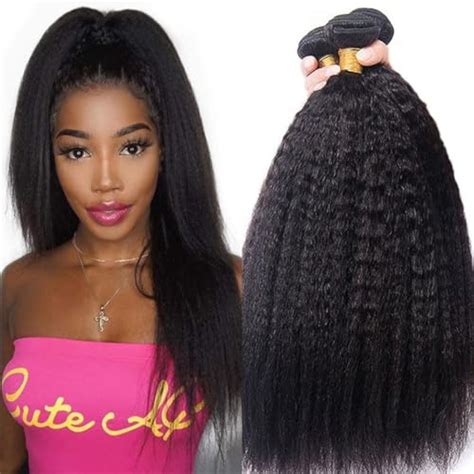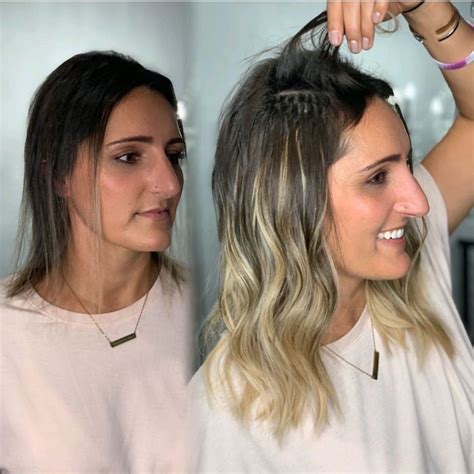Thinning hair can be a significant source of frustration and distress, impacting self-confidence and overall well-being. The global hair care market is projected to reach a whopping $395 billion by 2029 (Grand View Research, 2023), reflecting the increasing demand for solutions to hair-related concerns. One such solution is hair extensions, which have become highly sought-after for individuals seeking to restore fullness and volume to their thin hair.

Understanding Thin Hair
Thin hair is characterized by a reduced number of hair follicles and decreased hair growth. This condition can result from various factors, including genetics, hormonal imbalances, aging, stress, and certain medical treatments. The National Institute of Health (NIH) estimates that approximately 50% of women and 20% of men over the age of 50 will experience some form of hair thinning or loss.
Causes of Thin Hair
Genetics: Hereditary hair thinning, known as androgenetic alopecia, accounts for the majority of cases (American Academy of Dermatology, 2023).
Hormonal Imbalances: Fluctuating hormone levels, such as during pregnancy, menopause, and thyroid problems, can lead to hair thinning.
Medications and Medical Treatments: Certain medications, including chemotherapy, radiation therapy, and antidepressants, can cause hair loss as a side effect.
Stress: Severe stress can trigger a condition called telogen effluvium, which causes excessive hair shedding.
Aging: As we age, hair follicles produce thinner hair, resulting in decreased volume and density.
Benefits of Hair Extensions for Thin Hair
Increased Volume: Hair extensions add instant volume to thin or fine hair, creating the appearance of thicker, fuller tresses.
Length and Style Versatility: Extend lengths and experiment with different styles, transforming short or flat hair into long, luscious locks.
Boosted Confidence: Regaining volume and length can significantly enhance self-esteem and boost confidence levels.
Scalp Coverage: Extensions can conceal thinning areas on the scalp, providing a natural and seamless appearance.
Types of Hair Extensions
Clip-In Extensions: Convenient and easy to apply, clip-in extensions clip directly onto existing hair and can be removed at the end of the day.
Tape-In Extensions: Thin, adhesive tabs are used to attach these extensions to the natural hair for a more permanent, long-lasting hold.
Fusion Extensions: Strands of hair are fused to the natural hair using heat or keratin bonds, resulting in a very secure and discreet attachment.
Microlink Extensions: Small metal rings are used to attach individual hair extensions to the natural hair, providing minimal damage and flexibility in application.
Choosing the Right Hair Extensions
Selecting the ideal hair extensions for thin hair requires considering several factors:
Desired Volume and Length: Determine the amount of volume and length you wish to add to your hair.
Hair Type: Match the texture and color of the extensions to your natural hair for a seamless blend.
Attachment Method: Choose a method that aligns with your desired level of commitment and hair health considerations.
Consultation: Schedule a consultation with a professional hair stylist to assess your hair and recommend the most suitable extensions.
Application and Maintenance of Hair Extensions
Professional Installation: Seek a skilled hair extension specialist to properly apply the extensions, ensuring a secure and natural attachment.
Regular Care: Follow the stylist’s instructions for washing, styling, and maintaining the extensions to prolong their lifespan.
Avoid Damage: Minimize heat styling, over-brushing, and harsh chemical treatments to preserve the health of both the extensions and your natural hair.
Removal: Have the extensions professionally removed when desired to avoid damage or tangles.
Conclusion
Hair extensions offer a transformative solution for individuals with thin hair, providing immediate volume, length, and confidence. However, it’s crucial to choose and apply the extensions carefully to ensure a natural appearance and minimal damage to your own hair. Consulting a professional hair stylist can guide you through the process and provide expert advice on the best extensions for your specific needs. Embrace the versatility and confidence that comes with fuller hair, and experience the joys of styling and expressing yourself without limitations.
Additional Resources
- American Academy of Dermatology
- National Institute of Health
- International Society of Hair Restoration Surgery
- Hair Extension Suppliers and Associations
